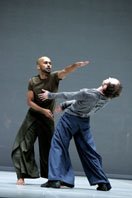 Last night, we went to the Sadler's Wells and saw Zero Degrees -- a stylish and fascinating collaboration between dancers and choreographers Akram Khan and Sidi Larbi Cherkaoui, artist Antony Gormley and composer Nitin Sawhney. Zero is a physical and textual exploration of the borders between countries, cultures, life and death and dancing traditions; of points of difference and points of return, that take place on a stage transformed into a large, pale grey box with two life-size silicone effigies of the dancers.
Last night, we went to the Sadler's Wells and saw Zero Degrees -- a stylish and fascinating collaboration between dancers and choreographers Akram Khan and Sidi Larbi Cherkaoui, artist Antony Gormley and composer Nitin Sawhney. Zero is a physical and textual exploration of the borders between countries, cultures, life and death and dancing traditions; of points of difference and points of return, that take place on a stage transformed into a large, pale grey box with two life-size silicone effigies of the dancers. The narrative circled around a trip Khan took from Bangladesh to India: his harassment at the hands of a corrupt border guard who seized his British passport, an encounter with a dead man in his train carriage on the way to Calcutta, and the detachment of his fellow passengers at the body.
During an after-show talk between Cherkaoui, Gormley and Khan, several audience members tried to share or seek explanations of the concept behind "zero degrees", but for me -- like with most dance and art -- the pleasure I derived wasn't dependent on applied meanings but on experiential feelings induced during the syncretic performance:
The music -- cello, violin, percussion and classical Indian vocals -- filtered hauntingly through a sheer gauze backdrop.
The onstage bond between Khan and Cherkaoui was bewitching and sensual: Khan's dancing is rooted in the classical Indian Kathak tradition whereas Cherkaoui's is entrenched in the contemporary modern. Khan's charismatic, burnished presence and his fluid, controlled, quickfire movements perfectly complemented Cherkaoui's languid, yielding, nervous movements of a contortionist.
Their differences initially attracted them and yet their similarities drew them closer still. Both are Muslim and grew up with a sense of cultural duality -- Khan a British Bangladeshi and Cherkaoui a Flemish Moroccan. As Khan put it after the show: "Larbi and I both live between two worlds. When I'm in Britain I feel Bangladeshi, when I'm in Bangladesh I feel British. It's the same for him."
I am always transfixed by Khan, but last night I was doubly so.
No comments:
Post a Comment